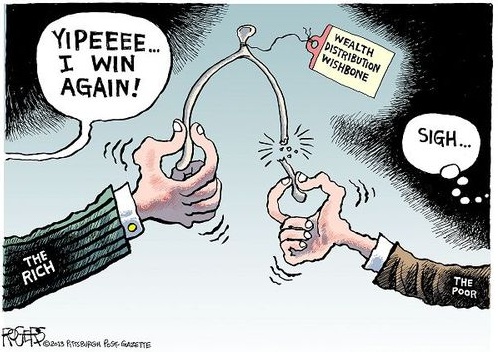Obinna Chima writes: By lifting the “small boats” of the poor and middle class, a fairer society and stronger economy can be built, the Managing Director of the International Monetary Fund (IMF), Christine Lagarde has said.
Lagarde in a report from the fund at the weekend, pointed out that growing and excessive inequality had become a problem for economic growth and development.
“You do not have to be an altruist to support policies that lift the incomes of the poor and the middle class. Everybody will benefit from these policies, because they are essential to generate higher, more inclusive, and more sustainable growth,” Lagarde declared.
“In other words, if you want to see more durable growth, you need to generate more equitable growth.”
A new IMF research showed that if the income share of the poor and middle class is lifted by one percentage point, then GDP growth would increase by as much as 0.38 percentage points in a country over five years.
By contrast, if the income share of rich is lifted by 1 percentage point, then GDP growth decreases by 0.08 percentage points.
“Our findings suggest that—contrary to conventional wisdom—the benefits of higher income are trickling up, not down,” Lagarde said.
Lagarde highlighted the divergence between a steady, decades-long fall in inequality between countries—driven by rapidly rising average incomes in emerging market economies—and growing income inequality within countries.
The two main factors driving the widening earnings gap between higher- and lower-skilled individuals, especially in advanced economies, are technological progress and financial globalization, Lagarde noted.
There are recipes for stronger, more inclusive, and more sustainable growth in all countries. These include macroeconomic stability—“Sound macroeconomic policies are the poor’s best friend”—supported by good governance, since corruption can be a strong indicator of profound social and economic inequality. Others are the adoption of prudent policies that strike a balance between promoting greater equality and preserving strong incentives to compete, innovate, and invest, adjusting fiscal policy by clamping down on tax evasion, removing unfair tax relief, reducing high labor taxes, relying more on conditional cash transfers, and freeing up resources by reducing energy subsidies; and enacting smart reforms in education, health care, labor markets, infrastructure, and financial inclusion, to lift potential economic growth and boost income and living standards over the medium term.
The IMF’s key mandate is to promote global economic and financial stability, and the institution has been deeply involved in development by helping its 188 member countries to design and implement policies and by lending to countries in times of distress, so they can get back on their feet.
“In sub-Saharan Africa, for example, many countries have applied sound macroeconomic policies over the past decade, and they are now reaping the benefits in the form of stronger growth and higher living standards. The IMF has supported these efforts through new instruments such as zero-interest loans, as well as increased financing and capacity building,” she added.

